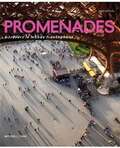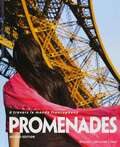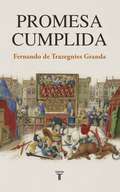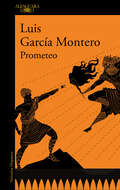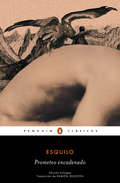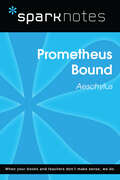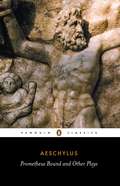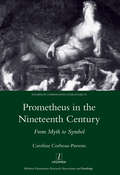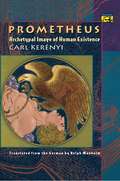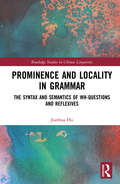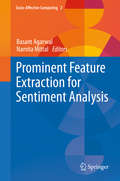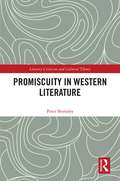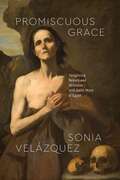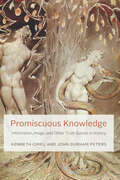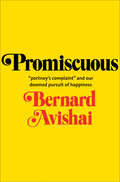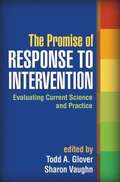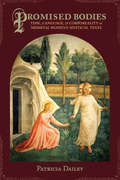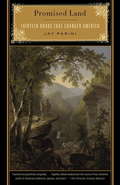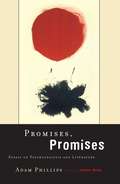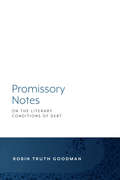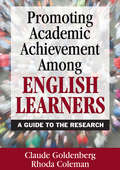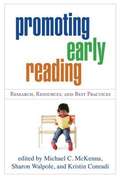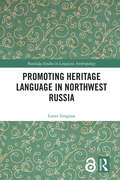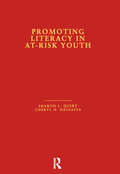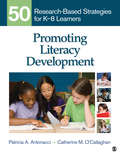- Table View
- List View
Promenades: A Travers Le Monde Francophone
by James G. MitchellWelcome to PROMENADES, Third Edition, a unique introductory French program from Vista Higher Learning. In French, the word promenades means strolls. The major strands in PROMENADES, Second Edition, are strolls planned to help you learn French and explore the cultures of the French-speaking world in the most user-friendly way possible. In light of this goal, here are some of the features you will encounter in PROMENADES, Third Edition.
Promenades: A Travers le Monde Francophone
by Cherie Mitschke Cheryl Tano James G. MitchellWelcome to PROMENADES, Second Edition, a unique introductory French program from Vista Higher Learning. In French, the word promenades means strolls. The major strands in PROMENADES, Second Edition, are strolls planned to help you learn French and explore the cultures of the French-speaking world in the most user-friendly way possible. In light of this goal, here are some of the fea¬tures you will encounter in PROMENADES, Second Edition.
Promesa cumplida
by Fernando de Trazegnies Granda"Este libro contiene ciertamente una novela. Pero esa novela no se llama Promesa cumplida ni tampoco ha sido escrita por quien aparece como autor del libro. En realidad, se trata de una novela, o romance de caballería, difundida en el S. XV, pero cuyos orígenes como historia contada oralmente se remontan al S. XIV". La Historia de Gillion de Trazegnies es un romance de caballería difundido en el S. XV, cuyo origen se remonta a la tradición oral del S.XIV, tal como ocurre con los cantares de gesta donde se narran las grandes hazañas de personajes épicos. El noble y valeroso Gillion de Trazegnies es uno de estos personajes que, a la manera de Mío Cid y Odiseo, debe cumplir la promesa del retorno a pesar de los infortunios y batallas que suceden a lo largo de una travesía entre Europa, Medio Oriente y el norte de África. Fernando de Trazegnies Granda traduce por primera vez al español esta novela medieval anónima escrita originalmente en francés antiguo, además de añadir comentarios, capítulos explicativos y un apéndice de notas históricas que brindan mayores detalles al lector contemporáneo sobre los personajes, valores, lugares, vestimentas, armas y otros aspectos de la época.
Prometeo
by Luis García MonteroEL NUEVO LIBRO DE LUIS GARCÍA MONTERO UN MITO CON PLENA VIGENCIA, EL DEL DESAFÍO A LOS DIOSES.UN CANTO DE ESPERANZA EN EL SER HUMANO. «Es uno de los pocos destinados a la letra grande de la historia de la literatura».José-Carlos Mainer «Admiro mucho su capacidad de seguir batallando, de no rendirse en la lucha por cambiar las cosas sin haber caído en la rabia, el resentimiento, la frustración».Juan Diego Botto «Se acercó hasta la hoguera, sostuvo la mirada contra el fuego y afirmó lentamente, una vez más: esperemos aún, sigamos todavía». Vivimos tiempos, como afirma Luis García Montero en este libro, en los que la conciencia del presente nos devuelve a la historia del pasado para fortalecernos en el deseo de resistencia. Y es éste el motivo que ha llevado al autor, a lo largo de los últimos años, a reflexionar desde el ensayo, la poesía y el teatro sobre la actualidad política y social del mito de Prometeo, ese titán que osó enfrentarse a los dioses y les robó el fuego para entregárselo a los mortales y regalarles con él la libertad. Esta obra reúne los textos de García Montero centrados en la figura rebelde de Prometeo. La pieza central —llevada a la escena por José Carlos Plaza en 2019 en el Festival de Teatro Clásico de Mérida— propone un diálogo intergeneracional entre dos Prometeos: el joven, que duda del acierto de su rebelión dado el castigo que trajo consigo, y el anciano, que desde su experiencia le muestra el triunfo que conlleva siempre buscar el bien común. En definitiva, Prometeo es un canto esperanzador sobre la humanidad, una lúcida reflexión en torno al poder de la solidaridad, la justicia y la libertad. Aquí, el mito, transformado a la luz de esta existencia convulsa e hiperconectada en la que estamos inmersos, sigue alentándonos hoy a sentarnos juntos alrededor del fuego para contarnos nuestro propio pasado y discutir sobre el futuro que merecemos. La crítica ha dicho:«Es uno de los pocos destinados a la letra grande de la historia de la literatura».José-Carlos Mainer «Parece capaz de contarnos, y de qué manera, lo que habíamos olvidado que sabíamos de nosotros mismos».Joaquín Sabina «Tono sostenido, poderosa nostalgia, emoción delicada que no alza la voz, poesía escueta, ceñida...».Octavio Paz «Admiro mucho su capacidad de seguir batallando, de no rendirse en la lucha por cambiar las cosas sin haber caído en la rabia, el resentimiento, la frustración».Juan Diego Botto «El mayor referente poético de España, cabeza de generación».Carmen Rengel, El HuffPost «García Montero ha defendido unos objetivos de invariable lucidez y ha logrado que su poesía remita con rigor minucioso a sus ideas estéticas. Y eso lo ha aproximado a lo que suele identificarse con un joven maestro».José Manuel Caballero Bonald «Siempre ha optado por ser testigo de su tiempo y su poesía ha sido el reflejo de sus inquietudes».Carmen Sigüenza, Agencia EFE
Prometeo encadenado
by EsquiloLa envidia, el incesto, la rebeldía, la arrogancia, la voluntad del hombre y sus límites, el parricidio o los celos se encuentran entre los temas abordados por Sófocles, Eurípides y Esquilo, los tres más grandes dramaturgos de la Grecia clásica. Los personajes representan a quienes violentan el orden natural del Universo, según la visión griega, y el castigo que reciben por su falta. Durante la antigüedad clásica, el teatro era uno de los medios para educar a la gente acerca de los dioses, de la moral, de la política y de las costumbres que se debían seguir para mantener en armonía el curso de los acontecimientos. Las historias que te ofrecemos fueron creadas para entretener al público y para enseñarles que sus actos tienen consecuencias.
Prometheus Bound (SparkNotes Literature Guide Series)
by SparkNotesPrometheus Bound (SparkNotes Literature Guide) by Aeschylus Making the reading experience fun! Created by Harvard students for students everywhere, SparkNotes is a new breed of study guide: smarter, better, faster. Geared to what today's students need to know, SparkNotes provides: *Chapter-by-chapter analysis *Explanations of key themes, motifs, and symbols *A review quiz and essay topicsLively and accessible, these guides are perfect for late-night studying and writing papers
Prometheus Bound and Other Plays: The Persians / Prometheus Bound / Seven Against Thebes / The Suppliants (The\complete Greek Tragedies Ser.)
by AeschylusAeschylus (525–456 BC) brought a new grandeur and epic sweep to the drama of classical Athens, raising it to the status of high art. In Prometheus Bound the defiant Titan Prometheus is brutally punished by Zeus for daring to improve the state of wretchedness and servitude in which mankind is kept. The Suppliants tells the story of the fifty daughters of Danaus who must flee to escape enforced marriages, while Seven Against Thebes shows the inexorable downfall of the last members of the cursed family of Oedipus. And The Persians, the only Greek tragedy to deal with events from recent Athenian history, depicts the aftermath of the defeat of Persia in the battle of Salamis, with a sympathetic portrayal of its disgraced King Xerxes.Philip Vellacott’s evocative translation is accompanied by an introduction, with individual discussions of the plays, and their sources in history and mythology.
Prometheus in the Nineteenth Century: From Myth to Symbol
by Caroline Corbeau-Parsons"On Zeus' order, Prometheus was chained to Mount Caucasus where, every day, he was to endure his liver being devoured by a bird of prey - his punishment for bringing fire to mankind. Through the impulse of Goethe, his fortune went through radical changes: the Titan, originally perceived as a trickster, was established both as a creator and a rebel freed from guilt, and he became a mask for the Romantic artist. This cross-disciplinary study, encompassing literature, the history of art, and music, examines the constitution of the Prometheus myth and the revolution it underwent in 19th-century Europe. It leads to the Symbolist period - which witnessed the coronation of the Titan as a prism for the total work of art - and aims to re-establish the importance of Prometheus amongst other major Symbolist figures such as Orpheus."
Prometheus: Archetypal Image of Human Existence (Mythos: The Princeton/Bollingen Series in World Mythology #132)
by Carl KerényiPrometheus the god stole fire from heaven and bestowed it on humans. In punishment, Zeus chained him to a rock, where an eagle clawed unceasingly at his liver, until Herakles freed him. For the Greeks, the myth of Prometheus's release reflected a primordial law of existence and the fate of humankind. Carl Kerényi examines the story of Prometheus and the very process of mythmaking as a reflection of the archetypal function and seeks to discover how this primitive tale was invested with a universal fatality, first in the Greek imagination, and then in the Western tradition of Romantic poetry. Kerényi traces the evolving myth from Hesiod and Aeschylus, and in its epic treatment by Goethe and Shelley; he moves on to consider the myth from the perspective of Jungian psychology, as the archetype of human daring signifying the transformation of suffering into the mystery of the sacrifice.
Prominence and Locality in Grammar: The Syntax and Semantics of Wh-Questions and Reflexives (Routledge Studies in Chinese Linguistics)
by Jianhua HuThis book challenges the current consensus on the analysis of wh-questions and reflexives from the perspective of the syntax-semantics interface. An integrated approach incorporating analyses of the interaction between different levels of linguistic knowledge is proposed. It argues that the derivation and interpretation of wh-questions and reflexives are not purely syntactic in nature but are regulated by principles operating at the syntax-semantics interface. Two general principles underlying our knowledge of language and cognition are proposed in this work. One is the Principle of Locality, and the other is the Principle of Prominence. It shows that although wh-quantification and reflexivization belong to two different domains of study in generative grammar, their derivation and interpretation are basically constrained by the complex interaction between prominence and locality in grammar. The first part of the book discusses how wh-questions are formed and interpreted in Chinese and English and shows that the formation and interpretation of wh-questions are constrained by the interaction between prominence and locality. It is shown that in wh-interpretation prominence is used to define the set generators so as to licence other wh-words in the pair-list reading in multiple wh-questions. It also discusses wh-island effects in English and Chinese, and unlike previous claims made in the literature (cf. Huang 1982a, 1982b), it argues that the so-called wh-island effects in English are also observed in Chinese. The second part of the book investigates the role that prominence and locality play in reflexive binding. It is shown that in reflexive binding, the binding domain of the reflexive is defined by prominence. It proposes a unified account for both the noncontrastive compound reflexive and the bare reflexive in Chinese and shows that they are constrained by the same reflexive binding condition proposed in this work, though they employ different definitions of the most prominent NPs to determine their binding domains. Prominence and Locality in Grammar: The Syntax and Semantics of Wh-Quesitons and Reflexives is an important theoretical contribution to the syntax-semantics interface studies and can serve as a valuable text for graduate students and scholars in the field of Chinese, linguistics, and cognitive science.
Prominent Feature Extraction for Sentiment Analysis
by Basant Agarwal Namita MittalThe objective of this monograph is to improve the performance of the sentiment analysis model by incorporating the semantic, syntactic and common-sense knowledge. This book proposes a novel semantic concept extraction approach that uses dependency relations between words to extract the features from the text. Proposed approach combines the semantic and common-sense knowledge for the better understanding of the text. In addition, the book aims to extract prominent features from the unstructured text by eliminating the noisy, irrelevant and redundant features. Readers will also discover a proposed method for efficient dimensionality reduction to alleviate the data sparseness problem being faced by machine learning model. Authors pay attention to the four main findings of the book : -Performance of the sentiment analysis can be improved by reducing the redundancy among the features. Experimental results show that minimum Redundancy Maximum Relevance (mRMR) feature selection technique improves the performance of the sentiment analysis by eliminating the redundant features. - Boolean Multinomial Naive Bayes (BMNB) machine learning algorithm with mRMR feature selection technique performs better than Support Vector Machine (SVM) classifier for sentiment analysis. - The problem of data sparseness is alleviated by semantic clustering of features, which in turn improves the performance of the sentiment analysis. - Semantic relations among the words in the text have useful cues for sentiment analysis. Common-sense knowledge in form of ConceptNet ontology acquires knowledge, which provides a better understanding of the text that improves the performance of the sentiment analysis.
Promiscuity in Western Literature (Literary Criticism and Cultural Theory)
by Peter StoneleyPoet and novelist Charles Bukowski described promiscuity as "feast and feast and feast." The promiscuous person is having fun, getting away with it, and showing no signs of stopping. More often, though, promiscuity has been seen as demonic, as the sign of an uncivilised race, or as a symptom of mental disorder. Promiscuity in Western Literature capitalises on the fact that literature gives us deep and varied resources for reflecting on this controversial aspect of human behaviour. Drawing on authors from Homer to Margaret Atwood, it explores recurrent ideas and scenarios: Why does the literature of promiscuity evoke ideas of the animal? Why does it so often turn upon the image of the "excessive" woman? How and why does promiscuity feature in comic writing? How does the emergence of the modern city change representations of promiscuity? And, in the present day, what impact have ecological concerns had on the way writers depict promiscuity?
Promiscuous Grace: Imagining Beauty and Holiness with Saint Mary of Egypt (Class 200: New Studies in Religion)
by Sonia VelázquezA meditation on holiness and beauty through the study of Saint Mary of Egypt. Saint Mary of Egypt has fascinated theologians, poets, and artists since the seventh century. Her story is richly evocative, encompassing sin and sanctity, concupiscence and asceticism, youth and old age. In Promiscuous Grace, Sonia Velázquez thinks with Saint Mary of Egypt about the relationship between beauty and holiness. Drawing on an archive spanning Spanish medieval poetry, Baroque paintings, seventeenth-century hagiography, and Balzac’s Le chef-d’œuvre inconnu, Velázquez argues for the importance of the senses on the surface of religious texts on her way to revealing why the legend of Saint Mary of Egypt still matters today.
Promiscuous Knowledge: Information, Image, and Other Truth Games in History
by John Durham Peters Kenneth Cmiel“[A] lively account of the cultural and intellectual history of how Americans have lived with image and information since the mid-nineteenth century.” —Peter Simonson, author of Refiguring Mass CommunicationSergey Brin, a cofounder of Google, once compared the perfect search engine to “the mind of God.” As the modern face of promiscuous knowledge, however, Google’s divine omniscience traffics in news, maps, weather, and porn indifferently. This book, begun by the late Kenneth Cmiel and completed by his close friend John Durham Peters, provides a genealogy of the information age from its early origins up to the reign of Google. It examines how we think about fact, image, and knowledge, centering on the different ways that claims of truth are complicated when they pass to a larger public. To explore these ideas, Cmiel and Peters focus on three main periods—the late nineteenth century, 1925 to 1945, and 1975 to 2000, with constant reference to the present. Cmiel’s original text examines the growing gulf between politics and aesthetics in postmodern architecture, the distancing of images from everyday life in magical realist cinema, the waning support for national betterment through taxation, and the inability of a single presentational strategy to contain the social whole. Peters brings Cmiel’s study into the present moment, providing the backstory to current controversies about the slipperiness of facts in a digital age.A hybrid work from two innovative thinkers, Promiscuous Knowledge enlightens our understanding of the internet and the profuse visual culture of our time.“With a clear voice and careful evidence, Promiscuous Knowledge offers fascinating glimpses into important people and practices from across the centuries.” —Fred Turner, author of From Counterculture to Cyberculture
Promiscuous: Portnoy's Complaint and Our Doomed Pursuit of Happiness
by Bernard AvishaiThe publication ofPortnoy’s Complaintin 1969 provoked instant, powerful reactions. It blasted Philip Roth into international fame, subjected him to unrelenting personal scrutiny and conjecture, and shocked legions of readers—some delighted, others appalled. Portnoy and other main characters became instant archetypes, and Roth himself became a touchstone for conflicting attitudes toward sexual liberation, Jewish power, political correctness, Freudian language, and bourgeois disgust. What about this book inspired Richard Lacayo ofTimeto describe it as “a literary instance of shock and awe,” and the Modern Library to list it among the 100 best English-language novels of the twentieth century? Bernard Avishai offers a witty exploration of Roth’s satiric masterpiece, based on the prolific novelist's own writings, teaching notes, and personal interviews. In addition to discussing the book’s timing, rhetorical gambit, and sheer virtuousity, Avishai includes a chapter on the Jewish community’s outrage over the book and how Roth survived it, and another on the author’s scorching treatment of psychoanalysis. Avishai shows that Roth’s irreverent novel left us questioning who, or what, was the object of the satire. Hilariously, it proved the serious ways we construct fictions about ourselves and others.
Promise of Response to Intervention
by Sharon Vaughn Todd GloverAs response to intervention (RTI) is adopted by increasing numbers of schools and districts, knowledge about "what works" continues to grow. This much-needed book analyzes the key components of RTI service delivery and identifies the characteristics of successful implementation. Critically reviewing the available research, leading authorities describe best practices in multi-tier intervention, assessment, and data-based decision making. Clear-cut recommendations are provided for implementing evidence-based interventions to support students' needs in reading, writing, math, and behavior. A state-of-the-art resource for K 12 practitioners and administrators, the book also will fill a unique niche in graduate-level courses.
Promised Bodies: Time, Language, and Corporeality in Medieval Women's Mystical Texts (Gender, Theory, and Religion)
by Patricia DaileyIn the Christian tradition, especially in the works of Paul, Augustine, and the exegetes of the Middle Ages, the body is a twofold entity consisting of inner and outer persons that promises to find its true materiality in a time to come. A potentially transformative vehicle, it is a dynamic mirror that can reflect the work of the divine within and substantially alter its own materiality if receptive to divine grace. The writings of Hadewijch of Brabant, a thirteenth-century beguine, engage with this tradition in sophisticated ways both singular to her mysticism and indicative of the theological milieu of the twelfth and thirteenth centuries. Crossing linguistic and historical boundaries, Patricia Dailey connects the embodied poetics of Hadewijch's visions, writings, and letters to the work of Julian of Norwich, Hildegard of Bingen, Marguerite of Oingt, and other mystics and visionaries. She establishes new criteria to more consistently understand and assess the singularity of women's mystical texts and, by underscoring the similarities between men's and women's writings of the time, collapses traditional conceptions of gender as they relate to differences in style, language, interpretative practices, forms of literacy, and uses of textuality.
Promised Land: Thirteen Books That Changed America
by Jay Parini"These thirteen books must be seen as representative, not definitive, works. They are nodal points, places where vast areas of thought and feeling gathered and dispersed, creating a nation as various and vibrant as the United States, which must be considered one of the most successful nation-states in modern history, and a republic built firmly on ideas, which are contained in its major texts. Where we have been must, of course, determine where we are going. My hope is that this book helps to show us where we have been and engenders a lively conversation about our destination, which seems perpetually in dispute." --from Promised Land. Americans need periodic reminding that they are, to a great extent, people of the book--or, rather, books. In Promised Land, Jay Parini repossesses that vibrant, intellectual heritage by examining the life and times of thirteen "books that changed America." Each of the books has been a watershed, gathering intellectual currents already in motion and marking a turn in American life and thought. Their influence remains pervasive, however hidden, and in his essays Jay Parini demonstrates how these books entered American life and altered how we think and act in the world. The thirteen "books that changed America": Of Plymouth Plantation * The Federalist Papers * The Autobiography of Benjamin Franklin * The Journals of Lewis and Clark * Walden * Uncle Tom's Cabin * Adventures of Huckleberry Finn * The Souls of Black Folk * The Promised Land * How to Win Friends and Influence People * The Common Sense Book of Baby and Child Care * On the Road * The Feminine Mystique. Promised Land offers a reading of the American psyche, allowing us to reflect on what our past means for who we are now. It is a rich and immensely readable work of cultural history that will appeal to all book lovers and students of the American character alike.
Promises, Promises: Essays on Literature and Psychoanalysis
by Adam PhillipsAs an essayist, Adam Phillips combines the best of two worlds: the mastery of psychotherapy as a practitioner and a theorist-and a reputation as one of the best literary writers around. In this collection of essays, he brings the two gifts to bear upon each other, reaching far beyond the borders of psychoanalytic discourse into art, novels, poetry, and history to speculate on the relative merits of psychoanalysis and literature. In his quirky, epigrammatic style, Phillips shows us how psychoanalysis and literature at their best share the goal of shedding light on human character, the most fascinating of disorders.
Promissory Notes: On the Literary Conditions of Debt
by Robin Truth GoodmanThere is no doubt that the beginning of the twenty-first century was marked by crises of debt. Less well known is that literature played a historical role in defining and teaching debt to the public. Promissory Notes: On the Literary Conditions of Debt addresses how neoliberal finance has depended upon a historical linking of geopolitical inequality and financial representation that positions the so-called “Third World” as negative value, or debt. Starting with an analysis of Anthony Trollope’s novel, The Eustace Diamonds, Goodman shows how colonized spaces came to inhabit this negative value. Promissory Notes argues that the twentieth-century continues to apply literary innovations in character, subjectivity, temporal and spatial representation to construct debt as the negative creation of value not only in reference to objects, but also houses, credit cards, students, and, in particular, “Third World” geographies, often leading to crisis. Yet, late twentieth century and early twenty-first literary texts, such as Soyinka’s The Road and Ngugi’s Wizard of the Crow, address the negative space of the indebted world also as a critique of the financial take-over of the postcolonial developmental state. Looking to situations like the Puerto Rican debt crisis, Goodman demonstrates how financial discourse is articulated through social inequalities and how literature can both expose and contest the imposition of a morality of debt as a mode of anti-democratic control.
Promoting Academic Achievement Among English Learners: A Guide to the Research
by Claude Goldenberg Rhoda ColemanDiscover the research and facts on what works in educating English learners! This comprehensive resource examines the research on promoting success among students who come to school knowing little or no English and translates current findings into specific recommendations for developing policies and programs for English learners. With illustrative scenarios throughout, this book gives educators and policy makers solid, research-based information about: Using students’ home language in academic programming Teaching English and academic content simultaneously School and district factors that affect achievement for English learners Sociocultural factors in success, including the influence of parents and families
Promoting Early Reading
by Michael Mckenna Sharon WalpoleBringing together leading scholars, this book describes proven ways to enhance early literacy skills in 3- and 4-year-olds, especially those from low-income families. Presented are scientifically based methods and approaches that are being applied in Early Reading First programs around the country. Important topics include promoting oral language and phonemic awareness, conducting read-alouds, setting up effective classroom environments, meeting the needs of English language learners, providing effective preschool coaching, using assessment to plan instruction, and helping students transition to kindergarten. Contributors also share lessons learned about evaluating and sustaining high-quality programs.
Promoting Heritage Language in Northwest Russia (Routledge Studies in Linguistic Anthropology)
by Laura SiragusaThis volume illustrates how language revival movements in Russia and elsewhere have often followed a specific pattern of literacy bias in the promotion of a minority’s heritage language, partly neglecting the social and relational aspects of orality. Using the Vepsian Renaissance as an example, this volume brings to the surface a literacy-orality dualism new to the discussion around revival movements. In addition to the more-theoretically oriented scopes, this book addresses all the actors involved in revival movements including activists, scholars and policy-makers, and opens a discussion on literacy and orality, and power and agency in the multiple relational aspects of written and oral practices. This study addresses issues common to language revival movements worldwide and will appeal to researchers of linguistic anthropology, sociolinguistics, education and language policy, and culture studies.
Promoting Literacy At-Ris
by Cheryl O. Hausafus Sharon L. QueryAbout one quarter of the children under the age of six are living in poverty, a factor that is highly relevant to school failure. It has been estimated that one quarter of the adolescent population is at risk of academic failure and other problem behaviors, with another quarter considered moderately at risk. School failure and the almost inevitable unemployment or underemployment that follows were among the most serious of these problems. This book examines the relationship between protective factors and academic achievement in elementary students. Protective factors are individual or environmental safeguards that enhance a youngster’s ability to resist stressful life events and promote resilience. There are protective factors at work in every system (individual, family, peer, school, and community.)
Promoting Literacy Development: 50 Research-Based Strategies for K-8 Learners
by Patricia A. Antonacci Catherine M. O′CallaghanFifty research-based literacy strategies designed for busy K-8 classroom teachersOrganized around 10 key areas for teaching and learning literacy—phonemic awareness, phonics, reading fluency, vocabulary, story comprehension, comprehension of informational text, questioning for understanding, discussion for understanding, narrative writing, and writing to learn-Promoting Literacy Development offers 50 clearly written, step-by-step strategies for developing proficient readers and writers. The authors also include suggestions for differentiating instruction for English language learners and for students with special needs.
